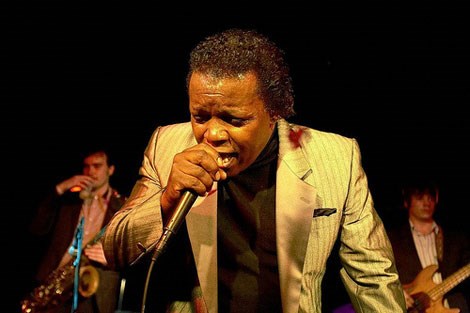What: Lee Fields and the Expressions
When: Sunday night
Where: Sugar Nightclub
Rating: 4-1/2 stars (out of five)
------------------------------------------
This week the party continues at TD Victoria International JazzFest with concerts by Herbie Hancock, Serena Ryder and David Murray/Macy Gray.
Such notables will have to toil hard to match the smoldering JazzFest set offered by Lee Fields on Sunday night.
New Jersey-based Fields, a veteran singer in his early 60s, offered a sweaty, impassioned evening of soul and funk, backed by his band the Expressions. His sound — and the group’s sharp-suited look — harkens to the 1966-to-1973 heyday of classic rhythm and blues.
Fields is part of a recent soul revival led by such artists as Charles Bradley and Sharon Jones. Like them, Fields is an older singer who’s been “rediscovered” and teamed with a band of young soul fanatics. Such music taps into retro fashion, yet what gives it staying power is the emotional honesty and blistering intensity these artists continue to offer.
After an instrumental, Fields scrambled onto Sugar Nightclub’s stage. A diminutive, even petite man, he wore a white tuxedo jacket with black piping.
“Let’s get this party started!” he declared. And so they did.
His song Ladies has a summery, Curtis Mayfield vibe. As the title suggests, it’s a paean to beautiful women. Fields — whose high tenor is tempered by a fine, sandpapery grit — glad-handed the female members of the packed club, singing: “Hey girl, what’s your name? Oh wow, you look so nice — I know your man is satisfied!”
Much of the night featured tunes from his latest disc, Faithful Man. A few oldies were tossed in as well, such as We Fought for Survival, first released by Fields as a single in 1970. A percolating funk tune in the style of James Brown (Field’s nickname used to be “Little J.B.”), it’s a reflection of the politically progressive R&B popular at the time, such as the Temptations’ Ball of Confusion.
By the time I Wish You Were Here was dispensed, things had heated up. For this ballad, which Fields dedicated to his late father, the singer expresses heartfelt pain over the loss of a loved one. When Fields sang, quivering the microphone at the end of each phrase, it was as if he’d opened wide the door to his soul.
Often, the best soul concerts pivot on the vocalist’s ability to transport the audience through catharsis. Like Wilson Pickett and Al Green, Fields has the talent — and emotive power — to offer singing that’s many things at once: a cry of anguish, a declaration of defiance, a triumphant affirmation of being alive.
We heard it during the song Faithful Man. By now, Fields had tossed away his tux jacket, his shirt unbuttoned, revealing a shining crucifix around his neck. Faithful Man is about a good man tortured by the temptations of the flesh: “Don’t make me do wrong. I’ve always been a faithful man till you came along.”
Midway through, Fields capped a rising series of horn blasts with an extraordinary scream, earning a beer-bottle salute and cheers from the exuberant, head-bobbing crowd. Two encores followed. For the third, the Expressions played an instrumental. This time Fields didn’t return to the stage. He’d already done his duty. And we understood this.



